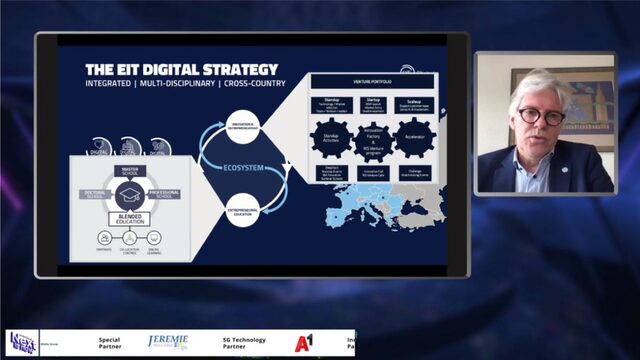Connectivity, growth, sustainability and entrepreneurship. Oh, and also lots of investor capital looking for what's next after the pandemic.
These were the main topics of this year's edition of the tech conference DigitalK, organized by Capital and LAUNCHub Ventures. The focus, of course, was the world post-COVID.
What has the pandemic changed? What has stayed the same? What is about to change in the next decade?
A different kind of connection
Djamel Agaoua, CEO of Viber Rakuten, the company behind the popular chat application of the same name, talked about how digital channels of communication are becoming channels for everything - from payments to self-expression.
Some of the biggest trends for Agaoua are the so-called deepfake videos, which he called "as exciting as they are terrifying", which is why Viber is betting on security and encryption in its products.

Alex Kuchar, director of A1 Telekom Austria Group, also talked about connectivity - although in a rather different vein. According to him, the rollout of the first 5G networks in different points of the world gives even more of an edge to the most innovative companies. Soon these effects will be felt by consumers.
Geography of technology
Only 12% of all unicorns in the world are from Europe, while 46% are from the US and 26% from China. Surprised? You shouldn't be.
The reasons are simple and in plain sight: the scarce and very different kind of investment in Europe according to Willem Jonker, CEO of EIT Digital. During his keynote address, however, Jonker also hit an optimistic note: this will be the digital decade of Europe and investments are rising. There is also a need for a digital single market to make European startups more competitive against American and Chinese ones.
But there is no question where the money is: it is in tech. Technology companies are now worth a whopping 35 trillion dollars - of which 24 trillion hails from the US, according to data from Dealroom, whose CEO Yoram Wijngaarde spoke from the virtual stage.
And although you already know who the giants are - Apple, Microsoft, Amazon, Google and Facebook, the dynamic is actually pretty high and new groups of startups are making as much value as the old ones. The bad news is that the "mortality rate" of companies before their fifth year is also high: 35%. But the most important trend is that Silicon Valley is (not so) slowly drifting away from being the center of the tech universe, and Europe is taking a bit of its market share in investments.
Matt Lerner, founder of Startup Core Strengths, also spoke about creating value. "Startups are not a small version of a big company," Lerner said. According to him, 90% of a startup's value comes from 10% of what they are doing. The tricky part is finding these 10%. "Every startup should have its Northern Star to follow. But apart from that, there is no actual playbook for how to achieve growth", Lerner said.
And while technologies made the world smaller, it also made it bigger in a way - cybersecurity is now facing a very big threat, called the Internet of Things. While IoT might be a force of good, it also makes networks of devices extremely complex to defend. That was the main point of Koen Gijsbers, former NATO director. Right now there are 7 billion active devices in the world, growing at 11% annually. And a lot of people still use "password" for password.

Keep it green (and cold)
"Investors are betting more and more on technologies for good", said Milly Shotter, a partner in UK-based Bethnal Green Ventures. Technology for good means focusing on the "need", not the "want", and doing everything as sustainably as possible.
Sustainability is the whole business of Plan A, founded by Bulgarian entrepreneur Lubomila Jordanova - although the company itself is based in Berlin. Plan A is measuring the carbon and ecological footprint of companies and helps them be as green and as responsible as possible. Jordanova gave a lot of interesting examples: did you know that all the mails sent in one day produce as much CO2 as seven million cars? We didn't. We do now. Don't send that next email!
And by the way, have you ever been on the Moon? Sebastian Aristotelis, space architect from SAGA Architects, has been. Well, not really, but kind of - Aristotelis told the story of how he lived for 100 days on the North Pole, in a pod, designed by him and his business partner Karl-Johansson Sorensen. Why? Because this is the closest environment to the Moon, without actually being on the Moon.
Don't panic, startups are here to stay
The second day of DigitalK focused almost entirely on startups and investors. The panel "Fueling growth" presented Petar Minkov from Gastronom.bg, Yavor Yordanov from EasyDoc, Galin Bonev from Econic One and Ivan Nikolov from Fantastic Stay - all of them are companies that fund-managers from the Fund of Funds have invested in, which only shows how much capital for startups there is in Bulgaria today - and most of it is still free.
Next up on the stage were Teodor Panayotov from Coursedot and Vladislav Vassilev from Pollenity - both of these companies changed their business model last year. Coursedot (which provides high-end IT training to companies) because of the pandemic, Pollenity (which helps beekeepers) - not so much, but the pandemic actually helped. The two companies show something that most people already know - good startups are here to stay.

After this the audience heard the story of Peter Lakatos from Entremo - a student turned entrepreneur because of the pandemic. Entremo makes hardware bracelets that measure heartrate, saturation and other vital metrics in patients in hospitals, and did not exist before the pandemic even as an idea. Lakatos said he hopes the company will go to production in the next 12 months - and that hospitals are open to these kinds of tech solutions.
The main insight of the two days of DigitalK is simple: the tech community now has its feet on solid ground. Although some things have changed, other aspects have stayed the same and the rest will change over the next few years. So we can firmly say that the tech community all around the world is alive and well.
Connectivity, growth, sustainability and entrepreneurship. Oh, and also lots of investor capital looking for what's next after the pandemic.
These were the main topics of this year's edition of the tech conference DigitalK, organized by Capital and LAUNCHub Ventures. The focus, of course, was the world post-COVID.












